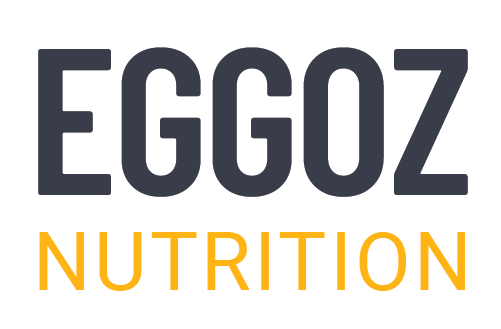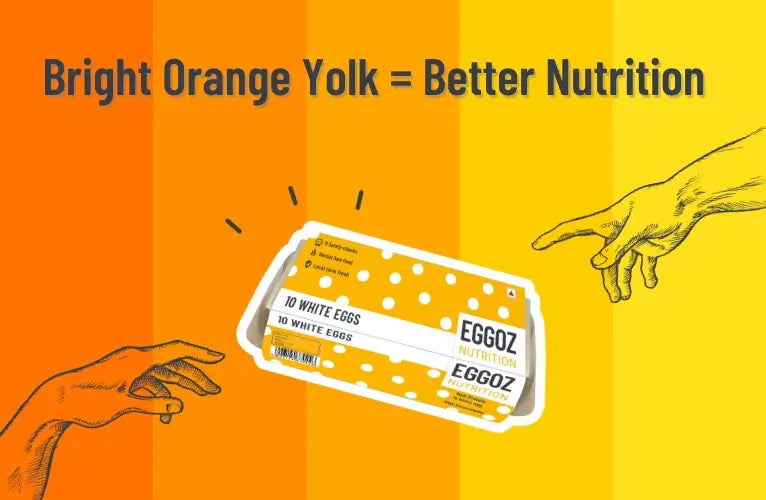When it comes to eggs, the yolk's colour is a palette of nature's own painting. From the lightest shades of egg yellow to the deep, rich tones of dark orange egg yolk, the variety is as intriguing as it is beautiful.
But what do these colours mean, and how do they affect our perception of an egg's quality?
This blog delves into the factors influencing egg yolk colour, its correlation with nutritional content, and what it says about an egg's quality.
The Nutritional Factor of Egg Yolks
Egg yolks are a powerhouse of nutrition, playing a crucial role in the overall nutritional profile of an egg. Here are some key nutritional factors of egg yolks:
- Rich in Vitamins and Minerals: Orange egg yolk is rich in Vitamin B12, which is crucial for nerve health and the synthesis of DNA, and Vitamin D, vital for bone health and immune function. They also contain minerals like phosphorus, important for bone health, and selenium, an antioxidant that helps prevent cell damage.
- High-Quality Protein Content: While most of an egg's protein is found in the white, the yolk contributes significantly. The protein in egg yolks is of high quality, containing all nine essential amino acids in the right ratios.
- Source of Good Fats: Egg yolks contain healthy fats, including monounsaturated and polyunsaturated fats. They also contain cholesterol, which, contrary to past beliefs, has a less significant effect on blood cholesterol levels for most people.
Different egg yolk colours and their Nutrition relevance:
Egg yolk colours vary widely, suggesting different dietary practices and nutritional profiles.
1. Dark Orange Yolks (Pasture Raised):
- Nutrition Significance: High in carotenoids, vitamins, and omega-3s due to a varied diet.
- Hen Category: Hens feed outdoors naturally on marigold, corn, maize, etc.
2. Bright Orange Yolks (Cage Free/Free Range):
- Nutrition Significance: Better carotenoid content due to a diet of mixed grains and some access to sunlight.
- Hen Category: Hens have more space than conventional cages and may have limited outdoor access.
3. Pale Yellow Yolks (Store Bought Mass Produced):
- Nutrition Significance: Standard nutritional value, with essential proteins and vitamins.
- Hen Category: Wheat-fed hens confined indoors without access to sunlight or a natural diet.
Understanding Yolk Colour Variation
Among the egg yolk colour, the orange egg yolk stands out. It's not just a colour but a symbol of quality for many. An egg with orange yolk is often perceived as a healthy, nutritious egg. While on the opposite end of the the the range lies the white egg yolk. While rare, this phenomenon can occur due to a lack of pigments in the hen's diet. It serves as a reminder of the crucial role diet plays in the life of a laying hen.
- Dietary Influence: The hen's diet is the most significant factor affecting healthy egg yolk colour. Hens that consume higher levels of carotenoids, natural pigments in plants like marigolds, corn, and alfalfa, produce eggs with darker yolks.
- Genetics and Environment: Beyond diet, the hen's breed can influence egg yolk colour, with some breeds naturally producing darker yolks. Factors like the hen's age and environmental stressors can subtly impact egg yolk colour.
Nutritional Implications of Egg Yolk Colour:
- Carotenoids and Health: Darker yolks contain higher concentrations of carotenoids, including lutein and zeaxanthin, known for their benefits to eye health. Eggs are a consistent source of high-quality protein, essential amino acids, vitamins, and minerals, regardless of egg yolk colour. The variance in specific nutrients, like omega-3 fatty acids and vitamin E, is more directly linked to the hen's overall diet rather than yolk colour.
- Misconceptions and Clarifications: Despite popular belief, yolk colour doesn't significantly impact the egg's primary nutritional value. This misconception has led to a disproportionate emphasis on egg yolk colour in assessing egg quality. While carotenoid-rich diets can contribute to a marginally higher nutrient profile, the difference is often negligible in a balanced diet.
Taste, Texture, and Consumer Preferences:
- Subjectivity in Taste and Texture: Taste and texture preferences are highly subjective. There is a common misconception that eggs with darker yolks have a richer flavour and creamier texture, although limited scientific evidence supports this. These perceived differences are more likely attributed to factors like the egg's freshness and the specific diet of the hen rather than the egg yolk colour itself.
- Marketing and Perception: The marketing of eggs often capitalises on consumer perceptions. Darker yolks are sometimes marketed as "more natural" or "healthier," influencing consumer choices. This marketing strategy demonstrates how consumer perception, rather than empirical evidence, can drive market trends.
Egg Quality Beyond Yolk Colour
- Indicators of Egg Quality: When evaluating egg quality, factors such as the hen's living conditions, overall health, and the egg's freshness are more critical than egg yolk colour. Eggs from hens raised in healthier environments, with access to the outdoors and a diverse diet, are generally more nutritious. These conditions can indirectly affect healthy egg yolk colour but are more directly related to the egg's overall quality.
- Holistic Assessment: Consumers should consider a holistic view when assessing egg quality. Labels like "free-range," "organic," or "pasture-raised" can be more indicative of egg quality than yolk colour. These terms often imply better living conditions for the hens and a more varied diet, which can lead to more nutritious eggs.
Conclusion: Deciphering the Hue
In summary, while egg yolk colour can offer insights into a hen's diet and lifestyle, it is not a definitive indicator of quality, nutritional value, or taste. The emphasis should be on understanding the egg's source, the conditions under which the hens are raised, and the egg's freshness. Eggoz Nutrition stands out for its commitment to quality and nutrition, offering eggs that are not only rich in taste but also in health benefits.
FAQs
What does the colour of an egg yolk indicate?
The egg yolk colour, ranging from light yellow to dark orange, primarily indicates the diet the hen has been fed. Hens that consume higher levels of carotenoid-rich foods, like marigold petals and corn, typically produce eggs with darker yolks. However, yolk colour is not a definitive measure of the egg's nutritional value.
Do egg with orange yolks healthier than those with yellow yolks?
Eggs with orange yolks often contain higher levels of carotenoids due to the hen's diet, but the overall nutritional difference compared to eggs with yellow yolks is relatively minor. All eggs, regardless of yolk colour, are nutritious, providing high-quality protein, vitamins, and minerals.
Where to buy orange yolk eggs?
Eggoz Nutrition stands out for its commitment to quality and nutrition, offering eggs that are not only rich in taste but also in health benefits. These eggs come from hens with a carotenoid diet and are often raised in more natural, free-roaming environments.
Does the egg yolk colour chart have any significance in choosing eggs?
An egg yolk colour chart can be a helpful guide to understanding the range of yolk colours based on the hen's diet. Observing the colour variation is interesting. Factors like the egg's freshness, the hen's living conditions, and the brand's overall quality and ethical practices are also important.


